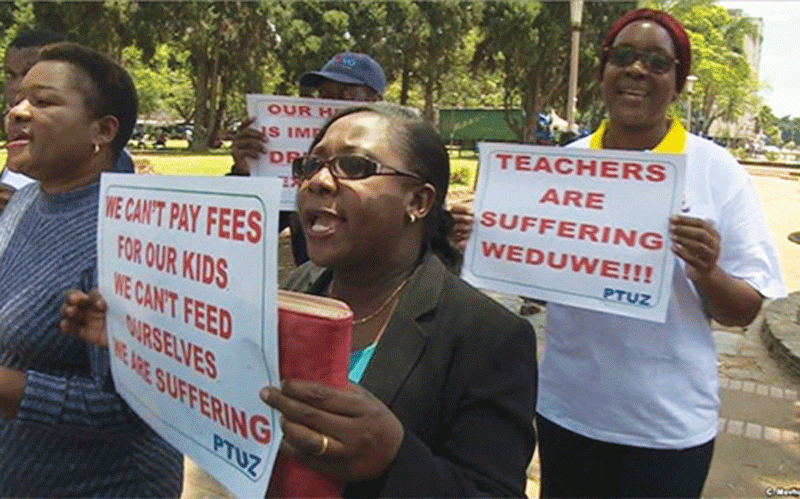
TEACHERS yesterday said they are not in a position to report for duty next week when schools officially open for the third term, citing incapacitation.
Schools are set to open next Tuesday for this year’s final term, which will be characterised by preparations for final examinations.
In March, the government increased their US$300 salary by US$20 to US$320, a figure which was deemed insignificant and out of touch with the economic realities being faced by the educators.
Teachers are demanding US$540 as the lowest salary.
Educators Union of Zimbabwe (EUZ) secretary-general Tapedza Zhou said the impoverishment of educators was largely affecting the quality of education for learners.
“As EUZ, we know that teachers cannot report for duty as they are incapacitated and this is a sad reality. We call upon the Minister of Public Service, Labour and Social Welfare to resolve salary issues with teachers because their impoverishment is taking a huge toll on the quality of education for all of our children,” Zhou said.
The declaration of incapacitation by teachers comes as a survey by the Amalgamated Rural Teachers Union of Zimbabwe (ARTUZ) showed that parents guardians, learners and teachers are not prepared for the re-opening of schools.
The survey focused on the preparedness of learners, teachers and schools.
- Teachers to embark on a go-slow
- Teacher unions blast free service move
- Budget falls short on education
- Zanu PF activist ‘terrorises’ teachers in Gutu
Keep Reading
“98,7% of parents and guardians in rural areas interviewed confessed that they do not have money to either pay school fees or secure learning materials. The majority of parents and guardians cited the El Niño-induced [drought] as the major driver of the unavailability of resources. Learners from child-headed families also indicated that they will not be able to go back to school because of lack of basics, including food,” the study read.
“In high-density suburbs, around 82,5% indicated that they will struggle to pay school fees. Some raised job losses as a driver of the poverty crisis. Those in the informal economy were complaining of low business returns in a depressed economy.
“In low-density suburbs, around 35% of the interviewed parents and guardians were extremely worried that they will fail to meet their educational financial obligations.”
The ARTUZ study revealed that around 70% of teachers interviewed indicated that they were severely incapacitated because of underpayment.
“The union noted that grain deliveries are being made across the country. Unfortunately, the majority of schools are still to receive anything. Mashonaland Central and Manicaland (provinces) have the highest number of schools that confirmed receiving grain deliveries.”
Teachers are currently demanding US$540 as the lowest salary.
The El Nino-induced drought has left more than half of the population food insecure.
President Emmerson Mnangagwa has declared the drought a state of national disaster to marshal about US$3 billion to avert hunger. He has said no one will die of hunger.
So serious is the threat of hunger that the Zimbabwe National Union of School Heads secretary-general Munyaradzi Majoni expressed concern over government’s decision to exclude former group A schools from the pupil feeding programme.
“We believe that they are in no better position than other schools. The fact that there are former group A schools means they are no longer up there,” he said
“The employer is loudly quiet about our remunerations. While giving grain is commendable, the government cannot ignore the human resource aspect. We may not be held unreasonable if we declare incapacitation. Sadly, from past experience, our employer waits for us to first declare incapacitation so that they act.”










